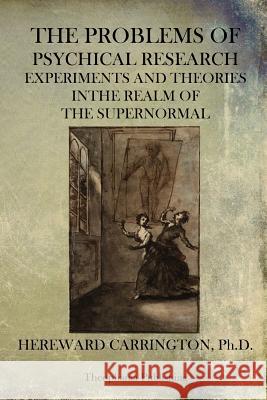The Problems of Psychical Research » książka
The Problems of Psychical Research
ISBN-13: 9781484919255 / Angielski / Miękka / 2013 / 298 str.
The Problems of Psychical Research
ISBN-13: 9781484919255 / Angielski / Miękka / 2013 / 298 str.
(netto: 69,90 VAT: 5%)
Najniższa cena z 30 dni: 72,60
ok. 16-18 dni roboczych.
Darmowa dostawa!
Thank you for checking out this book by Theophania Publishing. We appreciate your business and look forward to serving you soon. We have thousands of titles available, and we invite you to search for us by name, contact us via our website, or download our most recent catalogues. In the following pages I have dealt chiefly with the mental or psychological phenomena of psychical research, and have not touched upon the physical manifestations to any extent. The book is mostly theoretical and constructive in tone; and, because of its speculative character, it may, perhaps, prove of value to future psychical investigators. It represents the author's conclusions after several years' experimentation; and, in a field so new as this, scientific hypotheses and speculations are assuredly helpful, indicating the road we must travel, and the possible interpretation of certain facts, which have been accumulated in the past, as the result of years of laborious research. I believe that practically all the phenomena of spiritualism are true; that is, that they have occurred in a genuine manner from time to time in the past; that they are supernormal in character, and are genuine phenomenal occurrences. But as to the further question: What is the nature of the intelligence lying behind and controlling these phenomena?, that, I think, is as yet unsolved, and is likely to remain so for some time to come. I do not believe that the simple spiritistic explanation, especially as at present held, is the correct one, nor one that explains all the facts; for I believe that the phenomena are more complicated than this. Nor are the ordinary psychological explanations at present in vogue adequate to cover them. The explanation is yet to seek; and the solution will only be found when a sufficient number of facts have been accumulated and the various explanatory theories have been tested, to see which of them is really adequate. My hope is that the present book may help to accomplish this result by supplying a little in both directions
Zawartość książki może nie spełniać oczekiwań – reklamacje nie obejmują treści, która mogła nie być redakcyjnie ani merytorycznie opracowana.











